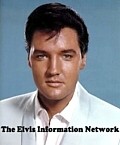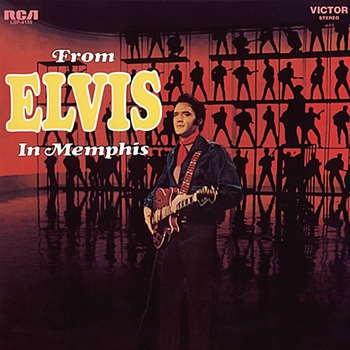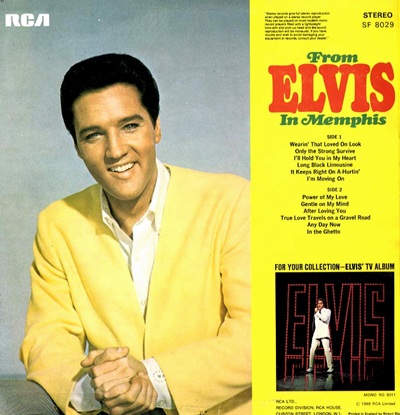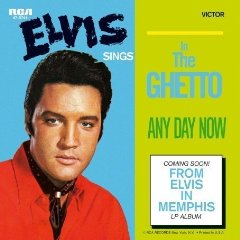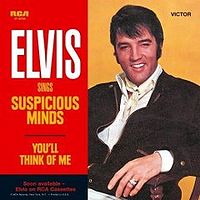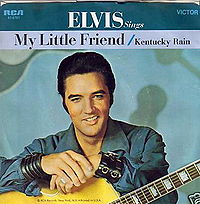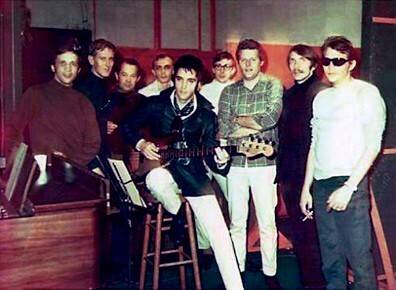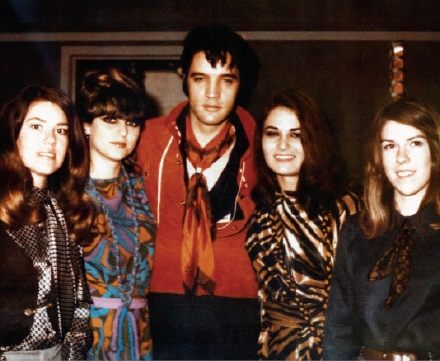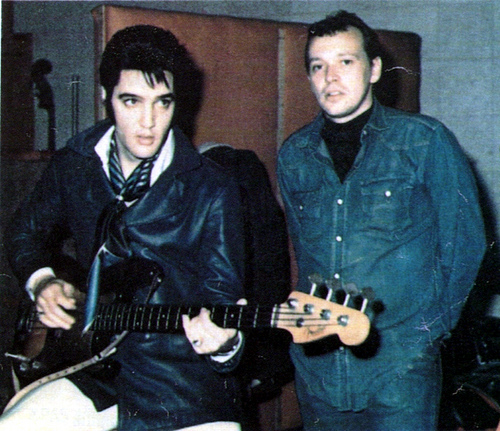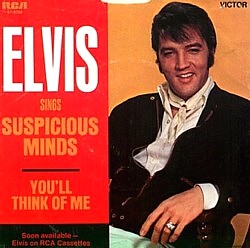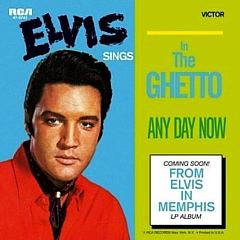"From Elvis In Memphis - is the only Elvis Presley record you need"
EIN Spotlight - 2015 |
 |
 |

"From Elvis In Memphis is the only Elvis Presley record you need" writes Kenneth Partridge for the A.V Club website.... Elvis Presley was at his most fascinating in the ’50s and the ’70s, when he seemed extraterrestrial. No one thinks much about Elvis in the interim. The ’60s were his humdrum human years, a decade of missed opportunities. After getting out of the army, he shellacked his pompadour, packed on a few pounds, started wearing tacky shirts, and shot a bunch of forgettable movies, each with its own forgettable soundtrack. He was still a handsome bastard and one of the biggest stars on the planet, but he slid into something like a routine, and there’s nothing cool about that. At the very end of the decade, though, he made the one Elvis Presley album everyone should own if they’re only going to own one. Released in June 1969, six months after NBC aired what’s become known as the ’68 Comeback Special, From Elvis In Memphis was Presley’s real return to form. It contains everything that was ever great about the King Of Rock ’N’ Roll. For starters, there’s rock ’n’ roll—a sound Presley had spent the preceding years neutering for Hollywood musicals. There’s also country, blues, and most importantly soul, which in the late ’60s was undergoing a major renaissance in Elvis’ hometown of Memphis. By reconnecting with the sounds he was raised on, Elvis rediscovered his voice and created an album that recalls his past triumphs and foreshadows his tragic demise. In its own grown-up way, From Elvis In Memphis nearly matches the mysterious brilliance of his early Sun Records stuff and the energy of his self-titled 1956 RCA debut. And yet with its strings and horns, it never lets you forget you’re hearing Presley on the eve of those gaudy ’70s, when he became a whole other kind of edgy. Some people prefer jumpsuit Elvis, and they’ll find his beginnings here. 'From Elvis In Memphis' presents a 34-year-old Elvis caught somewhere between nice Southern boy with otherworldly charm and reclusive millionaire basket case. Within that gap, there’s plenty of room to move. Presley plays grunting sex beast on the bluesy "Power Of My Love," lovesick wretch on the country weeper "It Keeps Right On A-Hurtin’," and faithful life companion on "True Love Travels On A Gravel Road," all sweetness and warmth. The orchestral-soul burner "Any Day Now" is about loving something and setting it free. "In The Ghetto" traces the structural cages keeping inner-city blacks down. Controversial for its time, "Ghetto" reached No. 3 on the Billboard Hot 100, giving Elvis his first non-gospel Top 10 hit since 1963. On the chart-topping follow-up "Suspicious Minds" — a brilliant non-album single included on subsequent 'From Elvis In Memphis' CD reissues — Elvis gets a little shady, warning his woman of jealous feelings that, let’s be honest, are probably totally justified.
The best song is "Long Black Limousine," the first one he tracked for the sessions that began on January 3, 1969, at American Sound Studio. This was Elvis’ first time recording in Memphis since he’d left Sun in the ’50s, and the homecoming didn’t simply mean a short commute. Reinvigorated by the NBC special and determined to "never sing another song that I don’t believe in," as he told TV producer Steve Binder, Elvis picked American Sound on the suggestion of buddy Marty Lacker. He had a feeling that studio boss Lincoln "Chips" Moman could give Presley what he needed, and for once, advice from Elvis’ inner circle wound up being sound. Moman had founded American after working at Stax, the label at the core of the ’60s Southern soul explosion, and like his former employers, he dealt in sweaty, funky roots music that couldn’t have shared less with the soundtrack pap Elvis had been pumping out. Moman also had an ear for hits, and he chose a bunch of songs he knew Elvis would sing the shit out of. "Long Black Limousine" was one of those. If Elvis hadn’t shown up at American Sound raring to go, despite some nervousness and a nasty cold, "Limousine" might have scared him out of giving some great performances. That is, of course, if he was self-aware enough to hear in Vern Stovall and Bobby George’s lyrics a bit of his own life story and a pretty chilling prophecy. The song is told from the perspective of a man who’s watched someone special — maybe a good friend, though more likely a lover — move off to the big city in search of fame and fortune. This dreamer gets seduced by the dark side and winds up riding in the kind of limo thousands of Memphians would gape at eight years later, in August 1977, after the King died in his bathroom at 42. The only difference is that Elvis’ car was white. Marcus isn’t exaggerating. "Limousine" opens with funeral bells and churchy organ that give way to bittersweet piano tinkling, and then Elvis sets the scene: "There’s a long line of mourners / Driving down our little street." The twist ending is right up front, and still Presley maintains the drama. The hoarseness that would halt the recording two days later adds to the vocal, and by the time he gets to the "Well I never, never, never" part, he’s obviously feeling something. He wasn’t enough of an actor to fake it. "He is completely convincing," Marcus writes in Mystery Train, adding, "When he smashes through the contradictions of his career with such music, we have Elvis at his greatest." The other song selected for these sessions that was sure to get Elvis’ grits boiling was "Only The Strong Survive," a muscular soul tune with a driving chorus bass line. The lyrics are filled with advice from a mother to her heartbroken son, and in the spoken-word intro, Elvis sets up the pep talk he’s about to relay. "I remember my first love affair," he says, as female backup singers repeat the keywords "I remember." "Somehow or another the whole darn thing went wrong. My mama had some great advice, so I thought I’d put it into words of this song… " Even in ’69, more than a decade after Elvis had lost his mother, Gladys, those lines must have given him pause. He’d grown up a hardcore mama’s boy, calling Gladys "baby" and reportedly sharing a bed with her into his early teens. When she died in 1958, he was inconsolable. "You cannot mistake the personal resonance that Elvis finds in the song," writes Peter Guralnick in Careless Love: The Unmaking Of Elvis Presley, the second installment of his definitive two-volume Presley biography.
In addition to marking what Guralnick calls "the birth of a new hybrid style" of country-soul music, "Only The Strong Survive" plays into Elvis’ weird, mystical back-story, adding an element of Oedipal intrigue that certainly isn’t needed to appreciate the album but can’t be dismissed, not when we’re talking about one of the most overanalyzed figures to ever walk the earth. Elvis’ legend persists because you can read so much into his story. He’s Christ, Icarus, Superman, the manifestation of the American dream, and the ultimate cautionary tale—all of those things plus whatever else anyone with a thesis and a keyboard cares to make the case for. As with any major historical figure (Lincoln, Hitler, JFK, etc.), Presley’s life is no longer bound by facts. Except, maybe, when it comes to music. Whatever the Presley saga becomes 500 or 1,000 years from now, it’ll be a way-gone tall tale with only a passing resemblance to the one Guralnick or anyone else has told. But 'From Elvis In Memphis' will still provide the best single-disc reminder of why anyone bothers to push the story forward. Back in 2009 EIN provided a seven-thousand word review - "The King Reclaims his Throne!" of the 40th Anniversary 'From Elvis In Memphis' Legacy release. Included in our thorough investigation was a comment about Elvis' backing band, sadly missed from the review above....
Chips Moman however would employ other notable names for his backing-vocals overdub phase, including vocalists Millie Kirkham, Ronnie Milsap (on Kentucky Rain), and Sandy Posey (famous for her hit single, Single Girl) along with Mary Holladay, Mary Greene, Donna Thatcher, and Ginger Holladay.
In American Studio:Elvis and backing vocalists Mary Holladay, Mary Greene, Donna Thatcher, and Ginger Holladay - Circa Jan 20 1969. - (From FEIM booklet)
The Memphis Horns were also used including Wayne Jackson ( read Wayne’s interview with EIN) plus numerous others, including R.F. Taylor on trumpet; Ed Logan on trombone and Joe D’Gerolamo on the French horn, were part of something special, even if many of them did not realise it at the time (such are the vagaries of making music). Great Right-Left channel separation means both backing vocals and instrumentation complement Elvis's searing vocals to perfection. Listening to the tracks recorded by Elvis over 10 nights in January and February 1969, the Chips Moman factor is obvious. Post production work would see Chips add another wonderful element, superb overdubs by the Memphis Horns, and on many tracks these would shine. Unfortunately, the potency of these overdubs has not been fully evident since 1969. That is until the Legacy edition of the From Elvis In Memphis sessions in 2009!
The sound made between Elvis, his backing vocalists, the Memphis Boys and the many overdub musicians is totally in the groove, gelling wonderfully to produce an formidable and undeniable part of music history."
So, to be honest, to the question, "Is 'From Elvis In Memphis' the only Elvis Presley record you need" the answer has to be NO! But to, "Is 'From Elvis In Memphis' the best Elvis album to introduce new fans to" the answer has to be YES! The haunting 'In The Ghetto' without added overdubs would never sound more haunting, emotional or perfect! FINAL NOTE - The value-add provided by 'From Elvis In Memphis' (2009 40th Anniversary Legacy edition) is delivered in spades! Glorious, remastered sound, expertly produced by the legendary Vic Anesini and some of Elvis’ greatest studio work add up to a ridiculously pleasing aural pleasure spread across 2 great discs. Anesini is renowned in the Elvis world for his exemplary remastering work. Elvis would never approach this level of creative genius again in the recording studio. His career was still to experience one final artistic high (Elvis: Aloha From Hawaii), but after the 1969 American Sound Studio sessions it would never really be the same again. Please go HERE for EIN's detailed review. "The King Reclaims his Throne!"
Spotlight compiled by Piers Beagley.
The SONY 'F.E.I.M Legacy' double-cd release is available for only $12 from Amazon - YES, every Elvis fan should purchase this quality bargain.
Elvis Vegas '69 may prove to be the perfect complement to From Elvis In Memphis: read all about this great new book by Ken Sharp And for more on the American Sound Studio sessions check out EIN's informative articles: 'From Elvis To Garth' Bobby Wood & The Memphis Boys; Chips Moman's American Studios - A Turning Point In History': EIN Review of FTD - Memphis Sessions
EIN Website content © Copyright the Elvis Information Network. .
. |
|
